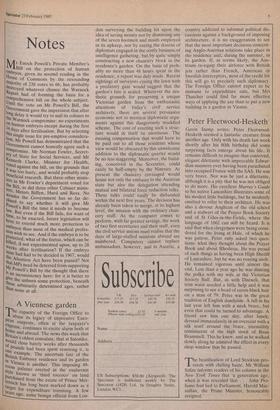A Viennese garden
The capacity of the Foreign Office to abuse its legacy of impressive Euro- pean outposts, often at the taxpayer's expense, continues to excite alarm both at 0_0M e and abroad. The news this week that Britain's oldest consulate, that at Salonika, Would close barely weeks after thousands of Pounds had been spent restoring it, is nn!example. The uncertain fate of the British Embassy residence and its garden In Vienna is another. This imposing 49- room palazzo erected in the exuberant style known as 'third roccoco' on land Purchased from the estate of Prince Met- ternich has long been marked down as a target for expenditure trimming. A few Years ago, some benign official from Lon
-, don surveying the building hit upon the idea of saving money not by dismissing any of the seven footmen and maids employed in its upkeep, nor by axeing the dozens of diplomats engaged in the costly business of intelligence gathering, but by quite simply constructing a new chancery block in the residence's garden. On the basis of prob- ably no more than 48 hours spent in the residence, a report was duly made. Recent sightings of surveyors eyeing the lawn with a predatory gaze would suggest that the garden's fate is sealed. Whatever the aes- thetic grounds for preserving a unique Victorian garden from the enthusiastic attentions of today's civil service architects, there are several persuasive economic not to mention diplomatic argu- ments against this dangerously muddled scheme. The cost of erecting such a struc- ture would in itself be enormous. The ensuing compensation that would have to be paid out to all those residents whose view would be obscured by this unwelcome addition to the diplomatic quarter would be no less staggering. Moreover, the build- ing, conceived in the Seventies, could easily be half-empty by the Nineties. At present the chancery envisaged would house not only the embassy to the Austrian state but also the delegation attending mutual and bilateral force reduction talks. These talks could easily be disbanded within the next five years. The decision has already been taken to merge, at its highest level, the mission with the ordinary chan- cery staff. As the computer comes to perform, with far greater savings, the work of two first secretaries and their staff, even the civil service unions must realise that the days of large-staffed missions abroad are numbered. Computers cannot replace ambassadors, however, and in Austria, a country addicted to informal political dis- cussions against a background of imposing architecture, it is no exaggeration to say that the most important decisions concern- ing Anglo-Austrian relations take place in the residence and, during the summer, in its garden. If, as seems likely, the Aus- trians re-equip their airforce with British jets rather than French, American or Swedish interceptors, most of the credit for this will go to precisely such diplomacy. The Foreign Office cannot expect to be immune to expenditure cuts, but Mrs Thatcher could find far more effective ways of applying the axe than to put a new building in a garden in Vienna.










































 Previous page
Previous page